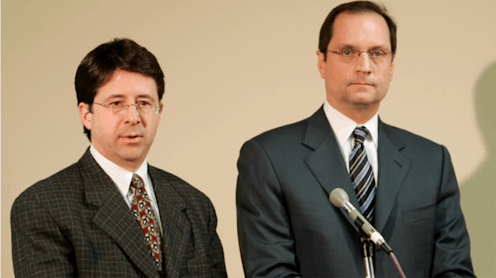
The public is a fickle beast. It can declare someone guilty before a trial has even begun, and cast doubts over someone's credibility without hard evidence. During the Steve Avery trial, Avery's name was dragged through the mud in various news reports ranging from local news stories to high-profile pundits on national networks. However, after Making A Murderer was released, the public seemed to flip — many people started to encourage Avery and his attempt to find purported justice for what he and his lawyers believe to be a wrongful conviction. The public definitely formed their opinions about Avery back in 2007, but what did they do with Buting and Strang, who were defending the so-called monster?
Well, nothing it seems. While it appears that almost every Wisconsin news outlet and show that covers true crime has had some kind of take on the Avery trial, their opinions aren't shared when it comes to the work of Buting and Strang. The narrative of the bloody, horrendous rape and murder of a photographer must not have left a lot of room for the story of two lawyers who were doing the best they could to free the man accused of the crime. While news outlets and pundits didn't comment on the lawyers specifically, many like Nancy Grace instead sought to poke holes in the defense's case — and she continues to do so today.
Both lawyers have, in separate instances, talked about the difficulties of participating in a criminal trial that is being held under a magnifying glass. Dean Strang told The Cap Times that "I don’t cooperate with the ilk ... [shows like] Dateline or 20/20... That’s the much more common approach; it’s a one-off, a quick-hit, driven-by-viewership paradigm or some sort of simple theme and I try to avoid that as much as I possibly can."
It's no wonder that Strang has been championing the Netflix series, as it's a long and detailed exploration of the case instead of a quick episode looking only at the surface level of the story.
Jerome Buting also had some thoughts on how the media interferes with public perception of trials. In an interview with Super Lawyers , Buting said: "From the defense perspective, you don’t normally get good publicity — particularly at the outset of a case — because the information is one-sided and limited. It’s coming from the criminal complaint or the press release from the police or something like that, and ethically defense attorneys are limited as to what we can say." Buting, despite hating the game of media, still plays because he knows that "they’re gonna do a story one way or the other."
During the documentary, there are several instances where the prosecution and defense talked to the media, trying to gain favor with the public. The media was often used against Strang and Buting — people were far too interested in convicting Avery and obsessing over the details of the murder to listen to the defense.
Image: Netflix